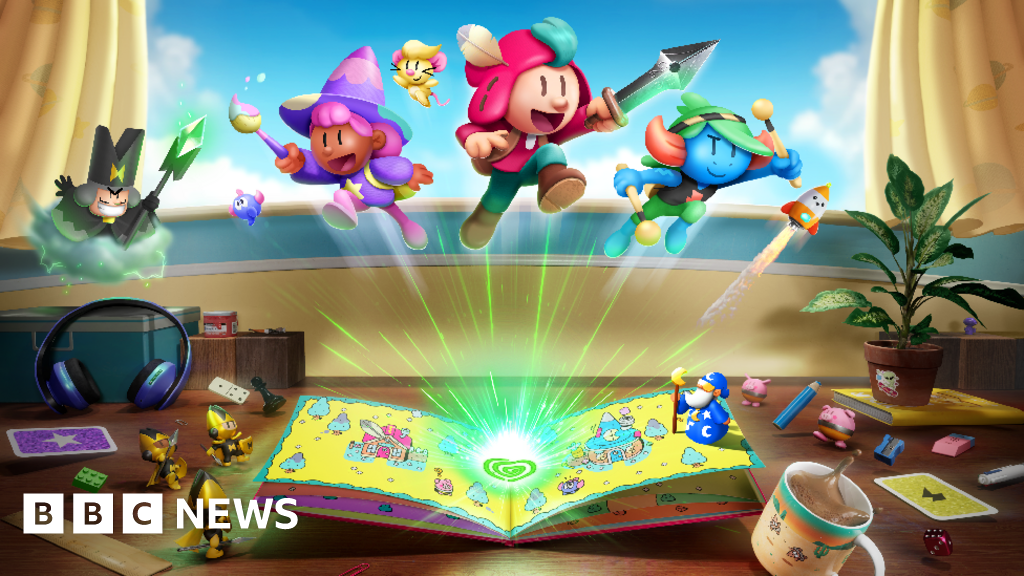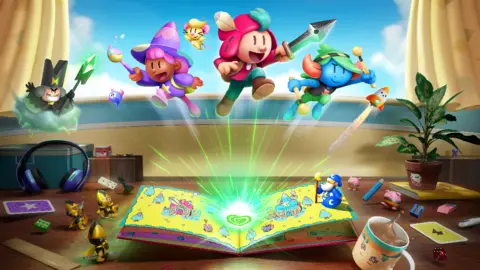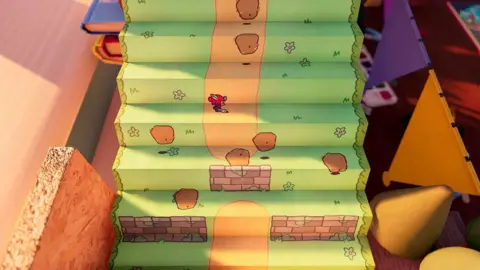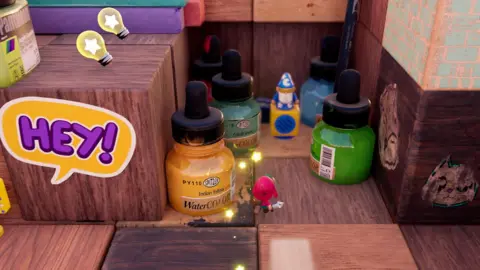Tech
The Plucky Squire: How the storybook adventure was made

 All Possible Futures
All Possible FuturesHave you ever wished a character from your favourite book would leap off the page?
Imagine if they actually could.
That’s the concept behind The Plucky Squire, a new video game set inside – and outside – a storybook.
The game follows title character Jot, and his quest to save the Land of Mojo from evil wizard Humgrump.
It’s a classic fairy tale setup, but the tongue-in-cheek adventure, heavily influenced by classics like The Legend of Zelda, has a trick up its sleeve.
Jot has the ability to jump between the 2D world of its pages and the 3D world outside – a cluttered desktop where everyday objects become towering obstacles for the tiny character to navigate.
The Plucky Squire is one of this year’s most anticipated independently developed games, and has landed to favourable reviews from critics.
And its release marks the end of a four-year quest for one of its lead designers, James Turner.
 All Possible Futures
All Possible FuturesJames has a fairy tale story of his own.
A keen artist, he studied computer graphics at university and got a job at a London game studio.
During a holiday to Japan, he tells BBC Newsbeat, friends encouraged him to send his portfolio to games companies and he got an interview with Pokémon spin-off developer Genius Sonority.
There was just one problem – James didn’t speak Japanese.
He turned up anyway, bringing a friend who translated, and he got the job.
“The good thing about being an artist is that your work can speak for itself,” he says.
“And then I was moving to Japan the next month to work on Pokémon Colosseum.”
James’s work was eventually noticed by Game Freak – the makers of the mainline Pokémon titles – and he ended up credited on about 20 games, working his way up to art director on 2019 Nintendo Switch titles Pokémon Sword and Shield.
James speaks fondly of his time in Japan but says he’s “always had a passion for doing, building things from scratch”.
He was looking to return to the UK, and had long wanted to set up his own studio, and discussed the idea with longtime friend Jonathan Biddle, who’s based in Australia.
Despite being on opposite sides of the world, they took the plunge and founded All Possible Futures.
Now they just needed a game to make.
 All Possible Futures
All Possible FuturesJames says the idea for The Plucky Squire came from picture books he’d been reading to his young son.
“I thought that could be a fun new twist on an action adventure where you’re walking around inside the pages,” he says.
After landing on the idea of a game set inside a book, James says he and Jonathan discussed putting “a surprise on every page”.
This got them thinking: “What would be the ultimate surprise?”
“We thought the ultimate surprise would be if you could actually jump out of the book and into the 3D world,” says James.
“That could be really kind of jaw-dropping, Matrix-style twist where you think you know the world but suddenly it’s completely different.
“And that caught our imagination.”
It also caught the public’s imagination.
The first glimpse of The Plucky Squire was a trailer seen during a showcase at 2022’s Summer Game Fest.
The 90-second clip ends with hero Jot popping out of the storybook’s pages and emerging into the 3D world outside.
There was a huge, positive response, with comments describing the moment as “mind-boggling”.
James and Jonathan had talked about keeping the dimensional switch under wraps until release, watching word-of-mouth spread as people discovered the secret.
“But you do want to get people excited and interested,” he says.
“And so it made sense to reveal that surprise.”
The reaction showed the team it was the right decision, says James, and also reassured him they were on to something.
“The more people are excited for what you’re making, and the greater the amount of people excited for what you’re doing, the more energy that feeds into the project,” he says.
“And it’s quite a positive reinforcement.”
 All Possible Futures
All Possible FuturesBut with excitement comes expectation, and The Plucky Squire was pushed back from its original 2023 release date to allow the team to polish it.
James admits the decision led to a “difficult conversation” with publisher Devolver Digital – the indie-focused company that’s released hits including Cult of the Lamb and Enter the Gungeon.
“And then it’s uncomfortable, but so what?” says James.
“Discomfort is just something you have to deal with in any walk of life and in development.
“You just have to do what’s right each step of the way and then hopefully you can work things out, and in this case we did.”
Throughout development, James and Jonathan worked from their homes in the UK and Australia, recruiting other team members based around the world as the project grew.
James says things have worked well despite the geographical spread, though he admits time differences did make things trickier once deadlines started looming.
Delaying The Plucky Squire had another, probably unplanned benefit.
The recent release of Astro Bot and the announcement of Sony’s upgraded £699 PlayStation 5 Pro has reignited some long-running debates among gamers.
Do people value games over graphics? And have blockbuster games lost their sense of fun as big companies race to create a new multiplayer hit or cinematic narrative adventure?
These are less pressing questions in the more creative indie space where James operates these days, but he agrees that people see a gap in the market.
“I think the desire for those kind of games are definitely there as an alternative to those kind of AAA more serious, darker kind of games,” he says.
“It’s nice to have a broader palette.
“Some people can enjoy that kind of game, other people might enjoy this one.
“And I am glad that we’re there – this bright and breezy console game to hand to those people.”












